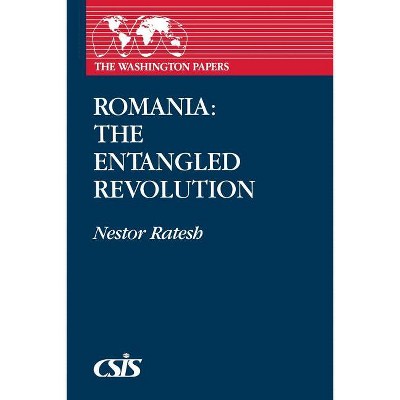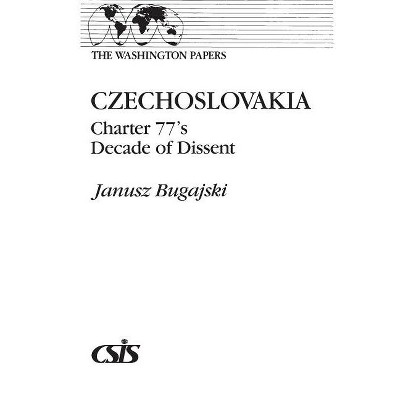Sponsored

The Republikaner Party in Germany - (Washington Papers) by Hans-Joachim Veen & Norbert Lepszy & Peter Mnich
In Stock
Sponsored
About this item
Highlights
- This volume presents a broad survey of the Republikaner Party, its program and ideology, its organization, and the composition of its voters and sympathizers.
- About the Author: HANS-JOACHIM VEEN is research director of the Konrad Adenauer Foundation in St. Augustin, Germany, and a member of the foundation's executive board.
- 108 Pages
- Political Science, Comparative Politics
- Series Name: Washington Papers
Description
About the Book
This volume presents a broad survey of the Republikaner Party, its program and ideology, its organization, and the composition of its voters and sympathizers. The authors maintain that any analysis of the Republikaners must distinguish between the party as represented by its platform and party officials, and the party as seen by its voters. Republikaners draw potential voters from two very differently motivated groups: (1) a small, ideologically oriented segment dominated by right-wing conservative and right-fringe extremist attitudes, and (2) a larger, flucating pool of sympathizers less committed to the REP and primarily concerned with economic and social issues. Until recently, the Republikaners were mainly able to exploit narrowly focused, pent-up resentments. The foreigner problem is at the center of Republikaners' propaganda and serves as a catalyst that adroitly combines numerous related social problems such as housing shortage, unemployment, and the widespread fear of being shunted aside by interlopers. Although the Republikaners still lack the social foundation and ideological consensus necessary to build a stable core constituency, the organization serves as a vehicle for diverse protest. The authors warn that the Republikaners potentially comprise a base for organizing a party on the far right of the German political spectrum.
Book Synopsis
This volume presents a broad survey of the Republikaner Party, its program and ideology, its organization, and the composition of its voters and sympathizers. The authors maintain that any analysis of the Republikaners must distinguish between the party as represented by its platform and party officials, and the party as seen by its voters. Republikaners draw potential voters from two very differently motivated groups: (1) a small, ideologically oriented segment dominated by right-wing conservative and right-fringe extremist attitudes, and (2) a larger, flucating pool of sympathizers less committed to the REP and primarily concerned with economic and social issues. Until recently, the Republikaners were mainly able to exploit narrowly focused, pent-up resentments. The foreigner problem is at the center of Republikaners' propaganda and serves as a catalyst that adroitly combines numerous related social problems such as housing shortage, unemployment, and the widespread fear of being shunted aside by interlopers. Although the Republikaners still lack the social foundation and ideological consensus necessary to build a stable core constituency, the organization serves as a vehicle for diverse protest. The authors warn that the Republikaners potentially comprise a base for organizing a party on the far right of the German political spectrum.Review Quotes
"Dr. Veen and his colleagues give us a balanced, concise, and readable survey of a party whose growth has been causing democratic Germany much worry recently. The authors' careful, detailed research yields a portrait of a grouping of the disaffected, alienated, and xenophobic, one that is neither ideological nor even rightist in the classical sense but that nevertheless bears close watching. This solid study fills an important niche in the current literature in English on German politics."- Robert Gerald Livingston Director, American Institute for Contemporary German Studies The Johns Hopkins University
"Will right-wing radical parties be an important feature of unified Germany's political landscape? Or are they just a passing phenomenon? Veen, Lepszy, and Mnich provide some answers with their timely insight into a party that has--until now--been little known or understood outside of Germany."-Daniel Hamilton Senior Associate Carnegie Endowment for International Peace
About the Author
HANS-JOACHIM VEEN is research director of the Konrad Adenauer Foundation in St. Augustin, Germany, and a member of the foundation's executive board. He was director of the Foundation's Research Institute from 1983 to 1992 and deputy director from 1978 to 1982. Currently he lectures in political science at Mainz University. Dr.Veen received his Ph.D. from Freiburg University and has published and lectured extensively on the West German party system and voting behavior.
NORBERT LEPSZY is a political scientist with the Research Institute of the Konrad Adenauer Foundation. He earned his Ph.D. at Bonn Univesity and has published and lectured on the German party system and on comparative politics. Dr. Lepszy currently lectures in political science at Munster University. PETER MNICH is research assistant at the University of Luneburg and a former staff member of the Research Institute of the Konrad Adenauer Foundation His interests include the area of empirical research, especially the analysis of cohort phenomena. Mr. Mnich received his M.A. in sociology from Kiel University.Shipping details
Return details
Trending Non-Fiction











